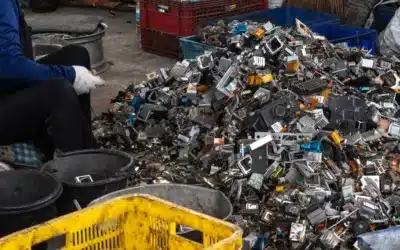ETH Zurich researchers unveil a protein-based, eco-friendly technique to recover gold from discarded electronics, promising environmental benefits and economic growth, while advancing circular economy initiatives and reducing reliance on traditional mining.
Researchers at ETH Zurich have announced a breakthrough in sustainable recycling with their innovative method of extracting gold from electronic waste. Every year, countless tonnes of electronic devices are discarded, often without individuals recognising the hidden value they hold. The recent discovery highlights that many of these devices contain small amounts of 22-carat gold, a finding that could significantly transform the recycling industry and foster new job opportunities in this vital sector.
The key to this advancement lies in a unique, eco-friendly extraction technique designed to efficiently retrieve these precious metals while reducing reliance on traditional mining operations, which are notorious for their environmental impact. The method developed by the researchers utilises protein-based sponges derived from whey, a by-product of cheese production. This innovative approach has demonstrated remarkable efficiency in capturing gold particles from dissolved metals found in discarded electronic devices.
In practical terms, the procedure involves dissolving metal components from old computer motherboards and then immersing a specially engineered protein sponge into this solution. As the sponge interacts with the mixture, it effectively attracts and collects gold particles, which are then purified into nearly pure gold nuggets, with estimates indicating that 20 discarded motherboards could yield around 450 milligrams of gold. This process not only provides a way to recover valuable materials but also promotes a more sustainable environmental footprint compared to traditional gold extraction methods, which often rely on toxic chemicals and consume vast energy resources.
Beyond the ecological advantages, the implications of this discovery extend to economic opportunities. The researchers anticipate that scaling up this method could lead to significant job creation within the recycling industry. To realise this potential, establishing suitable infrastructure for the collection and processing of electronic waste is critical. This goal calls for cooperation among governments, companies, and consumers. Proposed strategies include buy-back programmes and enhancing public awareness campaigns that underline the true value found in discarded electronic devices.
Experts assert that these initiatives could cultivate a more responsible approach to waste management, significantly diminishing the pressure on existing mining deposits, which frequently involve high environmental and social costs. By transforming electronic waste from mere rubbish into a treasure trove of recoverable materials, we could move closer to fulfilling the principles of the circular economy.
As technology continues to evolve, and as more sustainable extraction methods are developed, we may all start to think differently about how we treat electronic waste. There’s gold in those mountains of waste!




